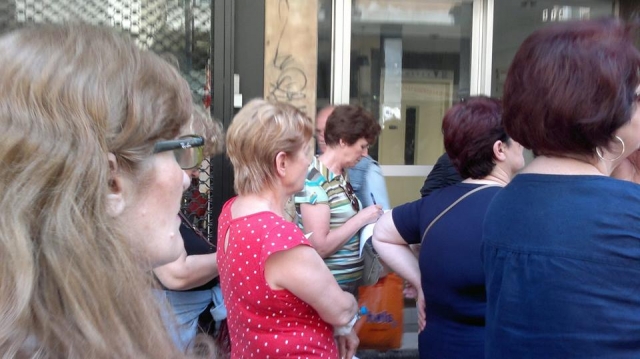Photos: Nikolinka Encheva
Anastasia Balezdrova
Following also the intervention on the part of GRReporter that enabled the Bulgarians in Athens to "gain" a polling station in the centre of the Greek capital we contacted the main initiator of the idea and subsequently a member of its electoral commission, Valeria Kertikova. It is worth noting that the opening of the station would not have been possible without the dynamic intervention of Lubomir Gavrilov, a professor of mathematics at the University of Toulouse in France. He is a representative of the temporary public councils of Bulgarians abroad and member of the #DANSwithmeGlobal group.
According to Valeria Kertikova, the voters were particularly satisfied with the opportunity to vote at a convenient place, without losing the rest of their day off to travel by public transport to the building of the Embassy of Bulgaria in the remote district of Paleo Psychico.
"We opened the station at 6:05 am on Sunday and we had two candidates to vote. One was a middle-aged man and the other a young boy. They told us that they had come straight from work to exercise their right to vote before going home," she said.
The normal influx of voters started at around 7:30 am. "At about ten o'clock the influx of voters increased. As I expected, the majority of the people came to vote after they finished their tasks, including sending parcels to Bulgaria, for example, or just after they met with friends to have a cup of coffee after the working week."
Valeria Kertikova said she was especially delighted by comments such as, "It is very good that they have opened a station in the centre", "Who had this good idea?" and others. "They made me feel very good."

The second big wave of voters came at around 2:30 p.m. and 3:00 pm. "Due to the noise that reached the voting hall we understood that a queue had formed. Some people became nervous because they had to wait - the day was beautiful and the sun was very hot." However, the tension did not transfer to the room with the ballot boxes. "Many people expressed their satisfaction with the opened station, saying, ‘Finally the Embassy did a good job."
According to Kertikova, only one woman probably had assumed that the commission members were employees of the Embassy and turned to them to complain that she could not get in touch with the diplomatic representation of Bulgaria in Athens over the phone.
About half an hour before the end of the voting, a large number of voters gathered again at the polling station and they were served in time. The election day ended normally and there was no need for extending the voting hours.
"We informed on the phone a representative of the Embassy about the voting activity, at 10:00 am, 2:00 pm and 7:00 pm. At 5:00 pm, Ambassador Mrs Emilia Kraleva came to the station. The counting of the ballots and the preparation of the documents continued until 2:30 am when we delivered them to the driver of the Embassy, who was escorted by security guards as provided by law."
Valeria Kertikova stressed that, as is clear from the reports of the three polling stations in Athens, the number of those who voted in the centre was slightly below the total number of those who voted at the two polling stations at the Embassy. "This shows that it would be more appropriate to open two polling stations in the centre for the next elections," she added. We recall that, according to GRReporter sources, at noon on Sunday, when the influx of voters in the polling station in the centre was most intense, some of the voters preferred to go to the Embassy to avoid waiting.
Valeria Kertikova expressed gratitude to the Bulgarian-Greek association for culture "Piasius of Hilendar" for housing the polling station and to its members for assisting towards the smooth conduct of the election process.